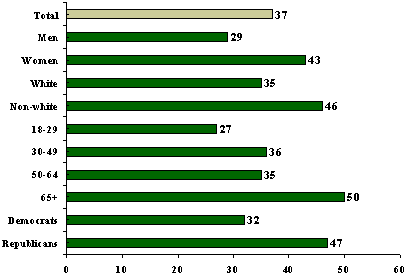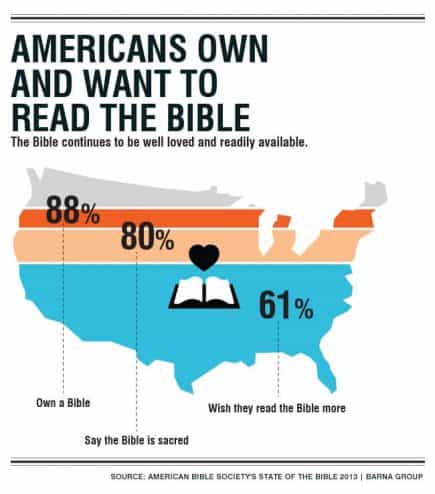
Recent surveys have sought to measure what Americans believe about some of the central messages of the Bible. Those who approach the book differently tend to say the Bible is positive but much less personal." "Those who have a habit of reading through the Bible a little each day say they have experienced this helpful, life-changing quality. "Scripture describes itself as 'living and effective,' according to the book of Hebrews," McConnell noted. Of the negative characteristics, 14 percent called the Holy Book "outdated," eight percent argued that it was "bigoted," and seven percent said that it was "harmful."

Over half, or 52 percent, called it a "good source of morals." A little bit over a third further described it as a "historical account," "helpful today," "true," and "life-changing." Still, respondents had a largely positive view of the Bible. LifeWay Research survey on Americans attitudes to the Bible released on April 25, 2017. Fifteen percent said that they don't have time to read it, and 13 percent argued they have already read enough of it. When asked to name the reasons why they don't read the Bible more often, 27 percent said that they simply don't prioritize it. As can be expected, those who attended church at least once a month were also more likely to read the Bible every day (39 percent), compared to those who attended less often (13 percent). Of those who read a little bit of the Bible each day, 49 percent were evangelicals while 16 percent were not evangelicals. The small percentage of Americans who have read all the scriptures is not for a lack of Bibles, LifeWay pointed out, with close to nine out of 10 households owning a copy. The only time most Americans hear from the Bible is when someone else is reading it." įor more articles in the "Short Answer" series, visit Gallup's The Short Answer page."Even among worship attendees less than half read the Bible daily. Įxplore Gallup articles about God and other religion-related topics on the "Religion" topics page.
#Percent of americans who never read the bible full
Gallup's full trends on religion are available on the Religion "Topics A to Z" page. Gallup measures Americans' views on God and religion as part of its Values & Beliefs poll - one of 12 surveys that make up the Gallup Poll Social Series. Still, the trends are recent enough that a majority of Americans likely remain believers today, regardless of whether the standard is absolute certainty or a propensity to believe. The 64% in 2017 saying they are convinced God exists and the 79% in 2016 saying God is something they believe in contrast with the 89% who in 2016 said they believe in God when offered only a "yes" or "no" response.īelief in God using the more complex response options (wordings B and C in the chart) would likely be lower today than when each was last asked in 2016 or 2017, mirroring the decline seen in 2022, when the more basic question (wording A) was updated. adults expressed certainty about the existence of God 21% said God probably exists, but they have doubts 6% said God probably doesn't exist and 7% were convinced God doesn't exist.


Other Gallup questions asked most recently in 20 offered more response options than a simple "yes" or "no," and found a lower percentage - 10 to 25 points lower - expressing a belief in God.

It reached a high of 98% in the 1950s and 1960s. Most recently, Gallup found 81% of Americans expressing belief when asked the simple question, "Do you believe in God?" This was down from 87% in 2017 and a record low for this question first asked in 1944, when 96% believed. In 2016, when 89% said they believe in God using the simple question, 79% said God is "something they believe in" rather than something they are not sure about or disbelieve. In 2022, 81% say they believe when simply asked, "Do you believe in God?" This is down from 87% in 2017, but another poll that year found 64% saying they are convinced God exists. Line graph showing trends in the percentages of Americans who believe in God, according to three different question.


 0 kommentar(er)
0 kommentar(er)
